Early Years / Key Stage 1 Curriculum
Useful articles in 'Primary History'
|
Each section of this unit begins by highlighting articles based on the current National Curriculum, and is followed by earlier pieces that are still worth reading. Please note that while the core advice is still relevant, articles from editions published prior to Primary History 66 will be based on the old National Curriculum. |
1. Overarching ideas, planning, organisation and understanding
2. Foundation/Reception
3. Teaching approaches
4. Significant people, places and events
5. Themes
6. Events within and beyond living memory
1. Overarching ideas, planning, organisation and understanding:
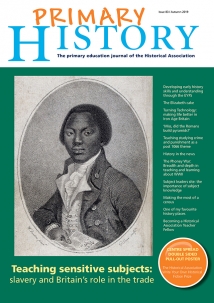
- Damienne Clarke, ‘Developing chronological understanding and language in the Early Years and Foundation Stage’ PH 86, Autumn 2020.
- Rob Nixon, ‘How to incorporate EYFS as a subject leader’ PH 85, Summer 2020.
- Stuart Boydell, ‘Democratising history lessons in Key Stage 1; how pupil voice shapes history teaching and learning in our school’ PH 84, spring 2020
- Emily Dickenson, ‘Developing early history skills and understanding through the EYFS’ PH 83, autumn 2019
- Paula Granger, ‘A first attempt at implementing the new curriculum in Year 2’ PH 68, autumn 2014. Overall curriculum plan.
Also:
- Hilary Cooper, ‘About the Past in the Foundation Stage and Key Stage 1’ in Leading Primary History: Support Materials for History Co-ordinators, Still much of relevance in this detailed article.
- Penelope Harnett, ‘I was meant to have been born on my birthday but I arrived a day late: Young children and chronology’, PH 59, autumn
- Anita Loughrey, ‘History in the Early Years’, PH 57, spring 2011.
- Kieran Egan, ‘Teaching history to young children’, PH 50, autumn 2008.
- Penelope Harnett, ‘Creating a Curriculum to help children in the early years understand the world in which they live: history and children in the early years’, PH 46, summer 2007.
- Cathy McIlroy, ‘Introducing History at KS1: A View from the Classroom’, PH 45, spring 2007.
- Penelope Harnett, ‘Foundation Stage and Key Stage 1 History: History and Citizenship Education: Teaching Sensitive Issues’ PH 45, spring 2007. Ideas and findings based on HA project.
- Tim Lomas, ‘Issues relating to the youngest children’ in PH 25 special edition: ‘Effective practice in the primary history curriculum 2000’. Although aimed at the 2000 NC orders much is still relevant.
2. Foundation/Reception (Ages 3-4)
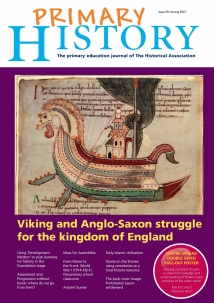
- Polly Gillow, ‘Similarity and difference with a tasty twist’, PH 97, summer 2024.
- Lucy Hawker, ‘Exploring sustainability in the Early Years’, PH 96, spring 2024.
- Stuart Boydell and Verity Downing, ‘How local history can bridge the gap from teaching Understanding the World in the EYFS to teaching history in Key Stage 1’, PH 93, spring 2023
- Jenny Munro, Paige Hazell, Tanya Wasik, Rianna Kelly and Helen Crawford, ‘Teaching about Remembrance Day in EYFS’, PH 92, autumn 2022.
Polly Gillow, ‘Jubilee medals: celebration and creation’, PH 90, spring 2022. - Simon Ellis and Mackay Howe, ‘How have schools interpreted the new EYFS Framework – including the introduction of the Past and Present ELG?’ PH 89, autumn 2022.
- Helen Crawford, ‘The revised EYFS Framework – exploring Past and Present’ PH 87, Spring 2021. New proposals
- Damienne Clarke, ‘Developing chronological understanding and language in the Early Years and Foundation Stage’ PH 86, Autumn 2020
- Helen Crawford, ‘Using Development Matters to plan learning for history in the Foundation Stage’ PH 69, spring 2015
- Hilary Cooper, ‘Early Years Foundation Stage’ PH 66, spring 2014. A summary of what is possible.
Also:
- Wendy Scott, ‘When we were Young: Emerging Historical Awareness in the Earliest Years’, PH 39, spring 2005. Includes 3 and under.
- Jayne Woodhouse, ‘Learning and Teaching about the past in the Foundation Stage’, in Leading Primary History: Support Materials for History Co-ordinators, 2005. Still much of relevance in this detailed article.
- Jayne Woodhouse, ‘Broadening reception children's experiences’ (Co-ordinators dilemma) in PH 31, Spring 2002.
- Jayne Woodhouse, ‘Reception History using Play ’ (Co-ordinators Dilemma) in PH 31, Spring 2002.
3. Methods and teaching approaches
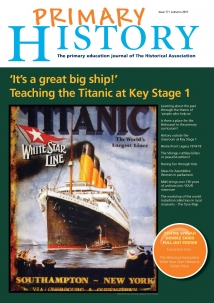
- Karin Doull, ‘Exploring the history of our place with very young children’, PH 95, autumn 2023
- Karin Doull, ‘Using picture books to explore ideas around history with very young children’, PH 94, summer 2023
- Karin Doull, ‘Exploring the past through active enquiry’, PH 91, summer 2022.
- Helen Crawford, ‘Ten texts for the Platinum Jubilee’ PH, 90, spring 2022.
- Jennie Wilkie, ‘How to make a Toy Museum’ PH 88, summer 2021
- Sarah Kirkland, ‘Using stories to support history skills and understanding in the EYFS’ PH 84, spring 2020
- Lisa MacGregor, ‘Using role play to develop young children’s understanding of the past’ PH 79, summer 2018
- Elaine Skates, ‘History outside the classroom at Key Stage 1’ PH 77, autumn 2017.
- Sue Temple, ‘Time for a Story: using stories in the Early Years and Foundation Stage’ PH 73, summer 2016.
- Helen Crawford, ‘Using artefacts to develop young children’s understanding of the past’ PH 72, spring 2016
- Helen Crawford, ‘Using role play to develop young children’s understanding of the past’ PH 71, autumn 2015.
- Hilary Cooper, ‘Why stories?’ (for early years) PH 67, summer 2014
Also:
- Penelope Harnett, ‘Why did you write it like a story rather than just saying the information?’ PH 56, autumn 2010. Use of stories with young children
- Christine Screech, ‘Doing History in the Early Years and Foundation Stage: Developing early historical understanding through the promotion of talk and thinking skills using a Picture Book’, PH 56, autumn 2010.
- Cathie McIlroy, ‘A View from the KS1 classroom: Investigating an Artefact’, PH 54, spring 2010.
- Bev Forrest and Dave Weldrake, ‘Archaeology and Early Years: The Noah’s Ark Experience’, PH 51, spring 2008.
- Jacqui Dean, ‘Case Study 2: Investigating a Picture in Key Stage 1’, PH 49, summer 2008.
- Penelope Harnett, ‘Polly Put the Kettle On: Using a nursery rhyme to develop children’s knowledge and understanding of the past’, PH 41, autumn 2005. Includes many resources.
- Paul Lunn, ‘Teaching history through the use of story: working with early years’ practitioners’, PH 37, summer 2004.
- Jayne Woodhouse, ‘Sources in KS1 and Foundation Stage’ (Co-ordinators’ Dilemma) in PH 34, Spring 2003.
- Jayne Woodhouse, ‘History Co-ordinators’ Dilemmas’ (KS1 role play) in PH 32, autumn 2002
- Linda Barnsdale-Paddock and Penelope Harnett, ‘Promoting Play in the Classroom as Curators in a Classroom Museum’, PH 30, January 2002.
- Pat Hoodless, ‘Written Sources and Local History at Key Stage 1’, PH 30, January 2002.
- Jayne Woodhouse, ‘Teaching History Through Nursery Rhymes in the Foundation Stage’, PH 27, January 2001.
4. Significant People, Places and Events
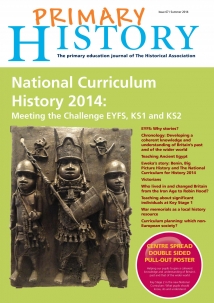
- Helen Crawford and Karin Doull, ‘Who is in charge?’, PH 98, autumn 2024.
- Karin Doull, ‘Olympics, past and present’, PH 97, summer 2024.
- Ailsa Fidler, ‘Earth heroes: Etta Lemon, the Mother of Birds’, PH 96, spring 2024.
- Sue Temple, ‘A Significant Local Event: Carlisle floods’, PH 96, spring 2024.
- Kate Loveman and James Harrod, ‘Exploring the Great Fire of London and Deaf history’, PH 95, autumn 2023
- Bee Rowlatt and Kirsty Ruthven, ‘Significant people: Why its worth considering Mary Wollstonecraft’, PH 94, summer 2023
- Matthew Sossick, ‘Teaching Robin Hood at Key Stage 1’, PH 93, spring 2023
- Karin Doull, ‘Remember, remember the Fifth of November! Where might the Gunpowder Plot sit within the principles of the new model curriculum?’ PH 92, autumn 2022.
- Centre spread on Gunpowder Plot, PH 92 autumn 2022.
- Karin Doull, ‘The new King’, PH 92, autumn 2022.
- Ailsa Fidler, ‘Wangari Maathai as a significant individual: positive representation within a broad and balanced curriculum’ PH 91, summer 2022.
- Helen Crawford, ‘Ten texts for the Platinum Jubilee’ PH, 90, spring 2022. Covers KS1 and KS2
- Karin Doull, ‘The Queen in Procession’, PH 90, spring 2022.
- Karin Doull, ‘Women and Space: reaching for the stars’, PH 89, autumn 2022.
- Matthew Sossick, ‘Arthur Wharton: The world’s first professional black footballer’ PH 88, summer 2021
- Melissa Chatton, ‘Happy 200th birthday Florence Nightingale’ PH 84, spring 2020
- Susan Townsend, ‘Up Pompeii: studying a significant event at Key Stage 1’ PH 82, summer 2019
- Karin Doull, ‘Three first-class ladies – teaching significant individuals in Key Stage 1: Harriet Quimby, Hilda Hewlett and Bessie Coleman’ PH 81, spring 2019
- Karin Doull, ‘To boldly go: exploring the explorers for primary history’ PH 80, autumn 2018. Covers KS1 and KS2
- Nina Sprigge, ‘Ideas for teaching at Key Stage 1 about Tim Berners-Lee, William Caxton and how technology has changed our lives’ PH 76, summer 2017.
- Sally Stafford, ‘Charles Darwin: exploring the man behind the beard – studying the lives of significant individuals in the past’ PH 75, spring 2017.
- Sue Temple, ‘Beyond compare: a study of Beatrix Potter and Benjamin Zephaniah’ PH 72, spring 2016
- Penelope Harnett, ‘Teaching about significant individuals at Key Stage 1’ PH 67, summer 2014. Case study of Ibn Battuta.
Also:
- Alison Gove-Humphries, Paul Bracey and Darius Jackson, ‘Why are you so angry Grace? Teaching and learning about Grace O Malley as a significant woman at Key Stage 1’ PH 65, autumn 2013
- Sarah Hanley, ‘Making the most of the moment; the Olympics and ICT in the Foundation Stage’ PH 62, autumn 2012.
- Lisa MacGregor and Sue Temple, ‘Cross-curricular project on a famous (or not so famous!) person’, PH 53, autumn 2009. Noor Inayat Khan
- Barbara Sands, ‘No lessons today – let’s go to the seaside’ in PH 52, summer 2009. Teaching about the seaside.
- Michelle Dexter, ‘Teaching Famous People at Key Stage 1: Say No to Flo!’ PH 64, autumn 2013.
- Jacqui Dean, ‘History in the Early Years: Bringing the Romans to Life’, PH 45, spring 2007.
- Jayne Woodhouse, ‘Significant people in Key Stage 1’ (Co-ordinators dilemma) in PH 39, spring 2005.
- Penelope Harnett, ‘Isambard Kingdom Brunel: a significant Victorian’ PH 37, summer 2004.
- David Field, ‘Take the Keep: Year 1 visit a Castle’ in PH 14, November 1997.
- Karen Salter, ‘Grace Darling and Reception Children’ in PH 14, November 1997..
5. Themes:
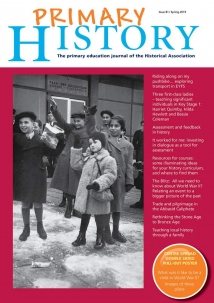
- Emily Rotchell, ‘The wheels (and horses…) on the bus’, PH 93, spring 2023
- Susie Townsend, ‘What’s in a road? Local history at Early Years and Key Stage 1’, PH 91, summer 2022.
- Karin Doull, ‘Communications: changes within living memory’ PH 84, spring 2020. Includes image and teaching ideas
- Helen Crawford, ‘Riding along on my pushbike…exploring transport in EYFS’ PH 81, spring 2019
- Sandra Kirkland, ‘Food – a theme for learning about the past’ PH 78, spring 2018
- Helen Crawford, ‘Learning about the past in the Early Years through the theme of people who help us’ PH 77, autumn 2017
- Sally Sculthorpe, ‘Overground, underground and across the sea: communications’ PH 76, summer 2017. Covers KS1 and KS2
- Helen Crawford, ‘Learning about the past through a study of houses and homes: early years focus’, PH 76, summer 2017.
- Sandra Kirkland, ‘Learning about the past through ourselves and our families’ PH 75, spring 2017
- Helen Crawford, ‘Learning about the past through a study of toys and games’ PH 74, autumn 2016..
6. Events Beyond and Within Living Memory
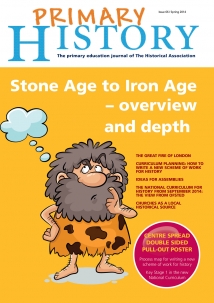
- Susie Townsend, ‘Musings and misconceptions about Remembrance Day’, PH 98, Autumn 2024
- Karin Doull, ‘Olympics, past and present’, PH 97, summer 2024.
- Stuart Boydell, ‘Significant anniversaries: The Bristol Bus Boycott, 1963’, PH 95, autumn 2023
- Helen Crawford and Sandra Kirkland, ‘Teaching changes within living memory: making the most of your school’, PH 95, autumn 2023
- Tim Lomas, ‘Significant anniversaries: The infamous Beeching Report 1963’, PH 93, spring 2023
- Karin Doull, ‘The Coronation’, PH 93, spring 2023
- Karin Doull, ‘Remember, remember the Fifth of November! Where might the Gunpowder Plot sit within the principles of the new model curriculum?’ PH 92, autumn 2022.
- Centre spread on Gunpowder Plot, PH 92 autumn 2022
- Heather de Silva, ‘The Great Exhibition of 1851: teaching a significant event at Key Stage 1’ PH 91, summer 2022.
- Damienne Clarke, ‘Significant anniversaries in 2022: 50th anniversary of the UK’s first official Pride march: 1 July 2022’, PH 90, spring 2022
- Helen Crawford, ‘Ten texts for the Platinum Jubilee’ PH, 90, spring 2022. Covers KS1 and KS2
- Karin Doull, ‘The Queen in Procession’, PH 90, spring 2022.
- Kate Rigby, ‘Happy and Glorious: exploring and celebrating the Platinum Jubilee’ PH 90, spring 2022. Covers KS1 and KS2
- Nina Sprigge, ‘Sources for the Great Fire of London and its context’ PH 88, summer 2021
- Paula Kitching / Elisabeth Parker, ‘Anniversaries: The Coventry Blitz, 14 November 1940 / The Grave of the Unknown warrior at Westminster Abbey: a hundred years of healing 1920-2020’ PH 86, autumn 2020
- Sandra Kirkland, ‘The Elizabeth Cake’ PH 83, autumn 2019 Using royalty and comparing
- Sue Temple, ‘Castles: distinguishing fact and fiction in the early years curriculum’ PH 80, autumn 2018
- Sarah Woods, ‘It worked for me: Knights and Castles’ PH 79, summer 2018.
- Karin Doull, ‘Here comes the 60s: exploring a period in living memory’ PH78, spring 2018.
- Jo Connor, ‘It’s a great big ship! Teaching the Titanic at Key Stage 1’ PH 77, autumn 2017. Includes co-ordinator notes.
- Karin Doull, ‘Planning for Changes within Living Memory’ PH 71, autumn 2015.
- Polly Tucknott, ‘Key Stage 1 local history through fresh eyes’ PH 70, summer 2015. Includes subject leadership
- Alison Hales, ‘Learning in the Early Years through Local People and Places: developing historical concepts in the Early Years Foundation Stage’ PH 70, summer 2015.
- Paul Bracey, ‘From Home to the Front: World War 1 in the primary history classroom’ PH 69, spring 2015. Covers KS1 and 2.
- Karin Doull, ‘The Great Fire of London’ PH 66, spring 2014. A detailed enquiry with resources (NB also includes Meryl Goldsmith, ‘The Great Fire of London through dance’ and Tim Lomas, ‘The Great Fire of London: what the co-ordinator might do’).

